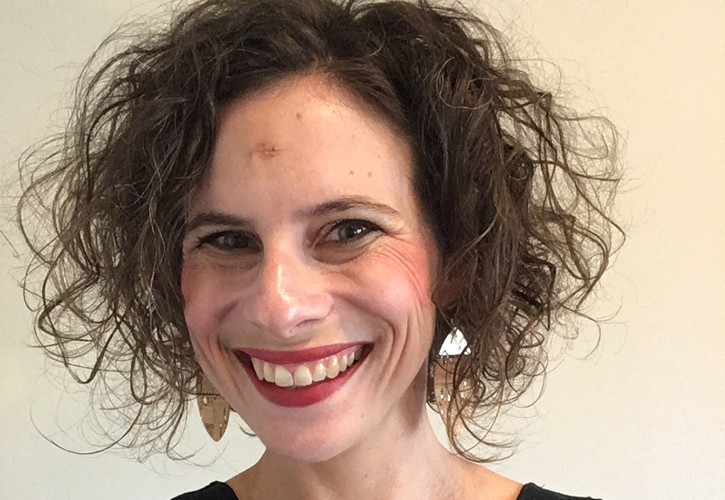College of Arts and Sciences Newsroom

University of Dayton sociologist awarded Science & Technology Policy fellowship from the American Association for the Advancement of Science
By Dave Larsen
A University of Dayton sociologist is working to reduce gender-based violence around the world through a competitive fellowship program that places scientists in U.S. federal government policy positions.
The American Association for the Advancement of Science awarded Jamie L. Small, assistant professor in the UD Department of Sociology, Anthropology and Social Work, a 2020-21 Science & Technology Policy fellowship (STPF). She is one of 284 highly trained scientists and engineers who will spend a year serving professionally in federal agencies and congressional offices, where they learn first-hand about federal policymaking and implementation.
“Particularly in this age of COVID-19, we are proud and grateful to usher in the 48th class of Science & Technology Policy fellows,” said Jennifer Pearl, STPF director. “The present state of the world demands a strong link between science and policy.”
In September, Small started her position at the U.S. Agency for International Development (USAID), which leads the federal government’s international development and humanitarian efforts, in the Office of Gender Equality and Women’s Empowerment. Her fellowship continues through August 2021.
“Over 70 years after the proclamation of the Universal Declaration of Human Rights, women and girls around the world still experience many forms of violence, harassment and discrimination,” Small said. “We work to change that by increasing gender equality and women's empowerment. USAID provides foreign aid, strategic leadership and technical assistance to international field missions in more than 80 countries.”
USAID invests in gender equality and women’s empowerment to provide equal access to education, justice systems, health care and technology, and equal control of resources, land and markets. The agency’s gender-based violence portfolio cuts across all these sectors, allowing Small to work on a wide variety of projects in many different countries.
“Right now, we’re kicking off the Better Together Challenge. This is a global funding initiative to increase security, economic stability and access to justice for the more than 5 million Venezuelans who have been displaced from their homeland,” she said.
“I'm also really excited to be working on one of the most innovative approaches to gender-based violence prevention that I've ever seen. The RISE (Resilient, Inclusive, Sustainable Environments) Challenge addresses gender-based violence in environmental programming. For example, one of our partners is doing work at the intersection of gender-based violence, women's land tenure, environmental degradation and artisanal mining in the Democratic Republic of Congo. It's important and fascinating work that is at the vanguard of the human rights movement.”
Small would have spent her fellowship year in Washington, D.C., but she is working remotely from her home in Dayton because of the coronavirus pandemic.
“In an ordinary fellowship year, I would get to travel to some of those field sites to see what our implementing partners are doing,” she said. “But with the COVID-19 pandemic, we shall see if that ends up happening for my cohort of fellows.”
Small holds a joint doctoral degree in sociology and women’s studies from the University of Michigan. Coming from the law and society tradition, her research centers on the intersection of law, crime and gender, with a specific focus on the construction of masculine vulnerability. She is working on a book manuscript that examines how prosecutors mobilize the law for men who are sexual victims.
She has taught a number of courses related to sexual violence and brought her expertise to campus-based initiatives that include the Sexual Violence Prevention and Education Advisory Council and PAVE (Peers Advocating for Violence Education) program.
“We're excited to see how her experience with the fellowship will contribute to campus-wide efforts related to sexual violence, as well as how it will inform her teaching in the future,” said Jeanne Holcomb, associate professor and interim chair of UD's Department of Sociology, Anthropology and Social Work. “I think it provides a tremendous opportunity for the UD community and our students to be able to have someone with this type of experience and expertise on campus.”
Small’s fellowship also will benefit the University of Dayton Human Rights Center (HRC), where she served as a 2018-19 faculty research fellow.
“While at USAID, Jamie is collaborating with us to share insights about cutting-edge development programming that addresses the interlinkages among gender and sexual violence, women's employment and economic empowerment, and climate and environmental resilience,” said Shelley Inglis, HRC executive director. “We expect to develop with Jamie an HRC series that brings learning and insights on these topical issues to the UD community in spring 2021.”
Small is eager to continue building these networks between Dayton and the global community. “It's an incredible honor to be in a position to apply my scientific expertise to help solve some of the world’s most pressing problems,” she said.
Founded in 1848, the American Association for the Advancement of Science is the world’s largest general scientific society and publisher of the journal Science. Since the launch of the Science & Technology Policy Fellowship program in 1973, more than 3,400 fellows have supported the executive, judicial and legislative branches of the U.S. government.
For more information, visit the UD Department of Sociology, Anthropology and Social Work website.
